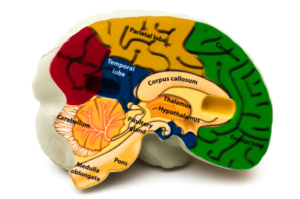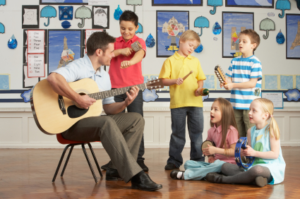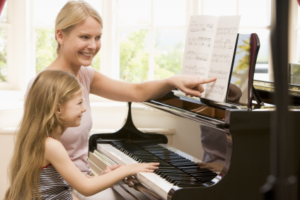“Six Things Every Parent Should Know About Music Education”
by Janice Tuck, Music Educator and Creative Director of The Fun Music Company
It’s true that there are so many demands placed on our children and on us as parents these days! With loads of extra curricula activities and extra testing now placed in our schools, parents can feel stretched in so many directions when it comes to knowing what are important activities for our children to participate in.
When it comes to learning music, parents often need to pay extra for lessons then children get taken out of classes to learn from a specialist instructor…and then there’s the at home practice. It just seems like there is so much extra work involved.
However, there is mounting evidence and research to suggest that music is an important part of every child’s education. Here are 6 important researched facts that every parent should know about the benefits of learning music:
1. “Early musical training can produce long lasting changes in behavior and on the brain”
Steele, Bailey J, Zatorre and Penhune “Early Musical Training and White-Matter Plasticity in the Corpus Callosum: Evidence for a Sensitive Period” The Journal of Neuroscience, 16 January, 2013
 Just recently, new research has been published stating that learning music especially at a young age (before the age of 7) can enhance communication between both sides of the brain. This is important to note because the brain works on a “use it” or “lose it” principle: so the more we use both sides the better it gets. What is interesting to note about this this research was that people involved in the study who started to play at a young age had more extensive wiring of the corpus callosum, which is the area of the brain which links the two hemispheres together and this was not as evident in people who started older. So it appears that music is not only one of the few activities to help activate both sides, but it’s also a fun way of doing it!
Just recently, new research has been published stating that learning music especially at a young age (before the age of 7) can enhance communication between both sides of the brain. This is important to note because the brain works on a “use it” or “lose it” principle: so the more we use both sides the better it gets. What is interesting to note about this this research was that people involved in the study who started to play at a young age had more extensive wiring of the corpus callosum, which is the area of the brain which links the two hemispheres together and this was not as evident in people who started older. So it appears that music is not only one of the few activities to help activate both sides, but it’s also a fun way of doing it!
 2. “Young children who take music lessons show different brain development and improved memory over the course of a year, compared to children who do not receive musical training. Musically trained children performed better in a memory test that is correlated with general intelligence skills such as literacy, verbal memory,
2. “Young children who take music lessons show different brain development and improved memory over the course of a year, compared to children who do not receive musical training. Musically trained children performed better in a memory test that is correlated with general intelligence skills such as literacy, verbal memory,
visuospatial processing, mathematics and IQ.”
Dr. Laurel Trainor, Prof. of Psychology, Neuroscience, and Behaviour at McMaster University, 2006
Wouldn’t we all want our children to perform better in numeracy and literacy? Especially with testing placed in our schools, it seems like music research such as this is suggesting that it’s an easy way forward in making such tests just a little easier on our kids!
 3. “Scientific studies across the world have shown that learning a piece of information -whatever it is – attached to a tune embeds that information more rapidly and with greater longevity than without it.”
3. “Scientific studies across the world have shown that learning a piece of information -whatever it is – attached to a tune embeds that information more rapidly and with greater longevity than without it.”
Howard Goodall, UK Singing Ambassador, “The Power of Music”
Have your children ever found it easier to remember facts such as the days of the week or the months of the year when they’ve sung it? Chances are they’ve learnt to sing it in preschool or school. One more of the amazing benefits of music!
4. “A controlled study involving 78 schoolchildren; suggests that music training produces long-term modifations in underlying neural circuitry in regions not primarily concerned with music, such as mathematics and science, which draw heavily upon spatial-temporal reasoning.”
Rauscher FH, Shaw GL, Levine LJ, Wright EL, Dennis WR, Newcomb RL, Neurol Res 1997. “Music and Spatial-Temporal Reasoning”
When researchers talk spacial-temporal reasoning, they are talking about the ability to place patterns and identify how those pieces fit into a space. Often children who have good spacial-temporal reasoning can visualize how things fit together step-by step and how they can be used in different patterns. Often this type of reasoning goes hand in hand with the ability
to problem-solve, for being organized and a talent for putting puzzles together. These abilities are important skills to have in areas such as architecture, engineering, science, mathematics, art, games and everyday life and the skill can be achieved through learning music.
5. “Children with music training had significantly better verbal memory than those without such training, and the longer the training, the better the verbal memory. Students who continued training and beginners who had just started learning to play both showed improvement in verbal learning and retention.”
Summary of paper by Ho, Y. C., Cheung, M. C., & Chan, in Neuropsychology, 2003. Quote found in “The Benefits of the Study Of Music”
This research is great news for parents wanting to “beef” up their child’s verbal memory and skills. It has been found that the time focusing on playing music may lead to growth in cells in the auditory cortex region of the brain. In turn these added brain cells in this area help with recollecting auditory information. So just by learning an instrument, this research suggests your child will be more likely to be good at recalling names and words and will be able to better spell them.
6. “The very best engineers and technical designers in the Silicon Valley industry are, nearly without exception, practising musicians.”
“The Case for Sequential Music Education in the Core Curriculum of the Public Schools,” The Center for the Arts in the Basic Curriculum, New York, 1989
What do we all want for our children when they grow up? Research has shown time and time again that most parents want their children to be healthy and happy, but
isn’t true that many parents also want them to be successful,
fulfilled and to be positive role models to others? It’s just interesting to note here that this is a select group of “successful” specialists and professionals and many of them learn and play music.
About The Author:
Janice Tuck is the creative director of the Fun Music Company. The Fun Music Company is an organization that exists to help music teachers and students have educational, fulfilling, and most of all FUN music lessons.
Learn more at the work of the Fun Music Company at http://www.funmusicco.com
